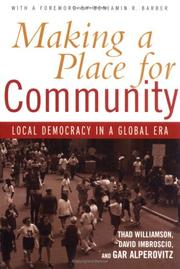| Listing 1 - 3 of 3 |
Sort by
|
Book
ISBN: 1603584927 Year: 2013 Publisher: White River Junction, Vermont : Chelsea Green Publishing,
Abstract | Keywords | Export | Availability | Bookmark
 Loading...
Loading...Choose an application
- Reference Manager
- EndNote
- RefWorks (Direct export to RefWorks)
Capitalism --- Income distribution --- Democracy --- Economic aspects --- United States --- United States --- Economic conditions --- Economic policy

ISBN: 0415947413 1315811189 1317794788 9781317794783 9781315811185 9780415933568 9781317794769 9781317794776 9780415947411 131779477X Year: 2002 Publisher: New York : Routledge,
Abstract | Keywords | Export | Availability | Bookmark
 Loading...
Loading...Choose an application
- Reference Manager
- EndNote
- RefWorks (Direct export to RefWorks)
When pundits refer to the death of community, they are speaking of a number of social ills, which include, but are not limited to, the general increase in isolation and cynicism of our citizens, widespread concerns about declining political participation and membership in civic organizations, and periodic outbursts of small town violence. Making a Place for Community argues that this death of community is being caused by contemporary policies that, if not changed, will continue to foster the decline of community. Increased capital flow between nations is not at the root of the problem
Community development, Urban --- -Community life --- -Urban economics --- Globalization --- #SBIB:041.IOS --- #SBIB:324H50 --- #SBIB:35H1350 --- Global cities --- Globalisation --- Internationalization --- International relations --- Anti-globalization movement --- Cities and towns --- City economics --- Economics of cities --- Economics --- Associations, institutions, etc. --- Human ecology --- Community programs, Urban --- Neighborhood improvement programs --- Urban community development --- Urban economic development --- City planning --- Sociology, Urban --- Urban policy --- Politieke participatie en legitimiteit (referenda, directe democratie, publieke opinie...) --- Organisatie en beleid: lokale besturen: algemeen --- Economic aspects --- Citizen participation --- Government policy --- Social aspects --- United States --- Economic conditions. --- Community life --- Urban economics. --- Globalization.
Book

ISBN: 1921862041 192186205X 9781921862052 9781921862045 9781921862045 Year: 2013 Publisher: Canberra ANU Press
Abstract | Keywords | Export | Availability | Bookmark
 Loading...
Loading...Choose an application
- Reference Manager
- EndNote
- RefWorks (Direct export to RefWorks)
The world has changed dramatically. We no longer live in a world relatively empty of humans and their artifacts. We now live in the “Anthropocene,” era in a full world where humans are dramatically altering our ecological life-support system. Our traditional economic concepts and models were developed in an empty world. If we are to create sustainable prosperity, if we seek “improved human well-being and social equity, while significantly reducing environmental risks and ecological scarcities,” we are going to need a new vision of the economy and its relationship to the rest of the world that is better adapted to the new conditions we face. We are going to need an economics that respects planetary boundaries, that recognizes the dependence of human well-being on social relations and fairness, and that recognizes that the ultimate goal is real, sustainable human well-being, not merely growth of material consumption. This new economics recognizes that the economy is embedded in a society and culture that are themselves embedded in an ecological life-support system, and that the economy cannot grow forever on this finite planet. In this report, we discuss the need to focus more directly on the goal of sustainable human well-being rather than merely GDP growth. This includes protecting and restoring nature, achieving social and intergenerational fairness (including poverty alleviation), stabilizing population, and recognizing the significant nonmarket contributions to human well-being from natural and social capital. To do this, we need to develop better measures of progress that go well beyond GDP and begin to measure human well-being and its sustainability more directly.
Economic Theory --- Business & Economics --- Economic development --- Environmental policy. --- Natural resources. --- Nature --- Environmental aspects. --- Effect of human beings on. --- Anthropogenic effects on nature --- Ecological footprint --- National resources --- Natural resources --- Resources, Natural --- Environment and state --- Environmental control --- Environmental management --- Environmental protection --- Environmental quality --- State and environment --- Eco-development --- Ecodevelopment --- Economic aspects --- Government policy --- Human beings --- Anthropogenic soils --- Human ecology --- Resource-based communities --- Resource curse --- Environmental auditing --- environmental policy --- economic development--environmental aspects --- Ecosystem --- Ecosystem services --- Gross domestic product --- Natural capital --- Quality of life --- Social capital --- Well-being
| Listing 1 - 3 of 3 |
Sort by
|

 Search
Search Feedback
Feedback About UniCat
About UniCat  Help
Help News
News